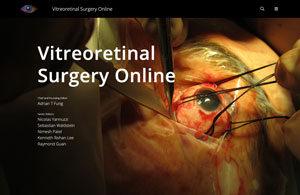13 Clinical Trials Summary
13.0 Introduction
13.1 Cornea
13.2 Cataract
13.3 Medical Retina – Age-Related Macular Degeneration (AMD)
13.4 Medical Retina - Diabetes
13.5 Medical Retina – Retinal Vein Occlusion (RVO)
13.6 Vitreoretinal Surgery
13.7 Glaucoma
13.8 Oculoplastics
13.9 Paediatrics
13.10 Neuro-Ophthalmology
13.11 Ocular Oncology
13.1 Cornea
Click to view other columns
HEDS [i,ii]
ACV = PO aciclovir TFD = topical trifluridine Steroid = pred. phosphate
Barron, B.A., Gee, L., Hauck, W.W. et al. 1994. Herpetic Eye Disease Study. A controlled trial of oral acyclovir for herpes simplex stromal keratitis. Ophthalmology 101(12) 1871-1882.
Wilhelmus, K.R., Gee, L., Hauck, W.W. et al. 1994. Herpetic Eye Disease Study. A controlled trial of topical corticosteroids for herpes simplex stromal keratitis. Ophthalmology 101(12) 1883-1895; discussion 1895-1886
| HEDS | Keratitis | Add | Already on | Outcome |
|---|---|---|---|---|
| 1 | Epithelial | ACV | TFD | <b>No benefit</b> = add ACV if 1. Stromal Keratitis or 2. Uveitis |
| 2 | Stromal | Steroid | TFD | <b>Benefit</b> = 1. Faster resolution 2. Less recurrence 3. Less uveitis |
| 3 | Stromal | ACV | TFD + steroid | <b>No benefit</b> in non-necrotising keratitis (but possible benefit in necrotizing stromal disease) NB: HEDS didn’t analyse disciform keratitis as subgroup |
| 4 | Uveitis | ACV | TFD + steroid | <b>May have benefit</b> (study stopped because of poor recruitment) |
| 5 | Recurrence Prophylaxis | ACV | Nothing | <b>Benefit</b> = reduced recurrence by 50% (if prior stromal keratitis, then 10x risk of future stromal disease) |
| Triggers | No triggers identified (stress, systemic infection, sunlight, menstruation, CL wear, eye injury) |
SCUT 1 [iii]
No difference in 3-month BCVA, safety, scar size, re-epithelialisation, corneal perforation with topical steroids given after 48 hours of moxifloxacin for corneal ulcers. Subgroup analysis found benefit for those with BCVA of CF or less or with central 4mm corneal involvement
Srinivasan, M., Mascarenhas, J., Rajaraman, R. et al. 2012. Corticosteroids for bacterial keratitis: the Steroids for Corneal Ulcers Trial (SCUT). Arch Ophthalmol 130(2) 143-150.
SCUT 2 [iv]
No difference in 12-month BCVA or scar. Subgroup analysis found that non-Nocardial infections had 1-line better BCVA and a significantly smaller scar with the early introduction of steroids. Of note, Nocardia is extremely rare in Australia and New Zealand
Srinivasan, M., Mascarenhas, J., Rajaraman, R. et al. 2014. The steroids for corneal ulcers trial (SCUT): secondary 12-month clinical outcomes of a randomized controlled trial. Am J Ophthalmol 157(2) 327-333.e323.
QLD Steroid Study [v]
Cohort of 328 patients of which 50% received high dose steroid within 7 days of infection. Odds ratio of better visual outcomes with high dose steroids was 5.49
Green, M., Hughes, I., Hogden, J. et al. 2019. High-Dose Steroid Treatment of Bacterial Keratitis. Cornea 38(2) 135-140.
MUTT 1 [vi]
Natamycin 5% vs. voriconazole 1% for filamentous fungal keratitis. Natamycin better outcomes (VA and less perforation; particularly for fusarium). Primary outcome VA 3 months
Prajna, N.V., Krishnan, T., Mascarenhas, J. et al. 2013. The mycotic ulcer treatment trial: a randomized trial comparing natamycin vs voriconazole. JAMA Ophthalmol 131(4) 422-429.
Previous
13.0 Introduction
Next
13.2 Cataract
All rights reserved. No part of this publication which includes all images and diagrams may be reproduced, distributed, or transmitted in any form or by any means, including photocopying, recording, or other electronic or mechanical methods, without the prior written permission of the authors, except in the case of brief quotations embodied in critical reviews and certain other noncommercial uses permitted by copyright law.
Vitreoretinal Surgery Online
This open-source textbook provides step-by-step instructions for the full spectrum of vitreoretinal surgical procedures. An international collaboration from over 90 authors worldwide, this text is rich in high quality videos and illustrations.
